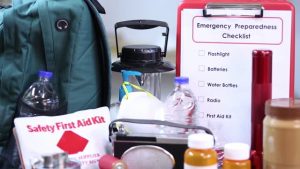
In this guide, we’ll explore essential strategies and steps to help your family prepare for and navigate various types of emergencies with confidence and resilience.
Emergency Preparedness: Steps to Take in Case of Family Emergencies:
Create a Family Emergency Plan:
Develop a comprehensive emergency plan that outlines roles, responsibilities, and communication strategies for each family member.
Identify potential risks and hazards in your area, such as natural disasters, severe weather, fires, or medical emergencies.
Establish Emergency Contacts:
Compile a list of emergency contacts, including family members, neighbors, healthcare providers, and local emergency services.
Ensure that everyone in your family knows how to contact these individuals in case of an emergency.
Assemble an Emergency Kit:
Create a well-stocked emergency kit that includes essential supplies, such as water, non-perishable food, first-aid supplies, medications, flashlights, batteries, and personal hygiene items.
Keep the emergency kit in a designated, easily accessible location in your home.
Stay Informed:
Stay informed about potential emergencies and local alerts by monitoring news updates, weather forecasts, and emergency notifications.
Sign up for emergency alerts and notifications from local authorities and government agencies.
Practice Evacuation Drills:
Conduct regular evacuation drills with your family to familiarize everyone with evacuation routes, meeting points, and emergency procedures.
Practice different scenarios, such as evacuating your home or sheltering in place during severe weather events.
Secure Your Home:
Take steps to secure your home against potential hazards, such as installing smoke alarms, carbon monoxide detectors, and fire extinguishers.
Ensure that windows and doors are secure, and consider reinforcing them against severe weather and intruders.
Plan for Special Needs:
Consider the unique needs of family members with disabilities, medical conditions, or special requirements when developing your emergency plan.
Make arrangements for necessary medications, medical equipment, and assistance during emergencies.
Stay Connected During Emergencies:
Establish multiple communication channels for staying connected with family members during emergencies, including cell phones, text messages, social media, and emergency radios.
Have a designated out-of-area contact that family members can reach to provide updates and coordinate reunification efforts.
Review and Update Your Plan Regularly:
Review and update your family emergency plan regularly to reflect changes in family dynamics, contact information, and emergency procedures.
Practice emergency drills and discuss safety protocols with your family regularly to ensure everyone is prepared and informed.
Emergency preparedness is a proactive and ongoing effort that requires careful planning, communication, and readiness. By taking the necessary steps to prepare your family for emergencies, you can enhance your ability to respond effectively, stay safe, and recover from unexpected events. Remember, being prepared is key to minimizing risks and protecting your loved ones during times of crisis or adversity.